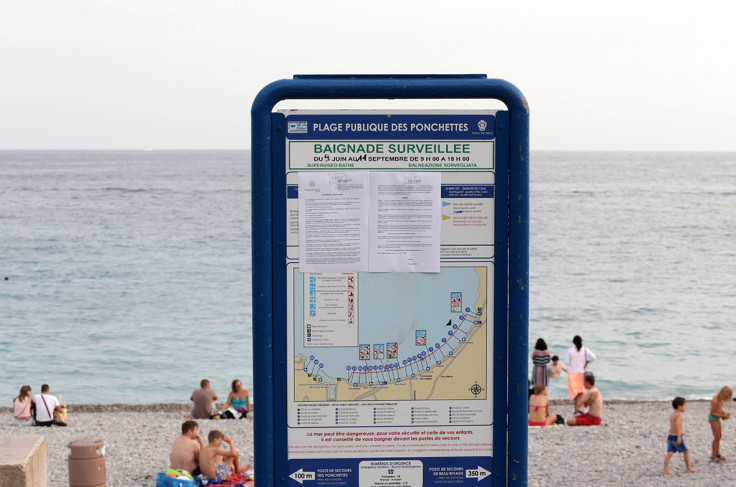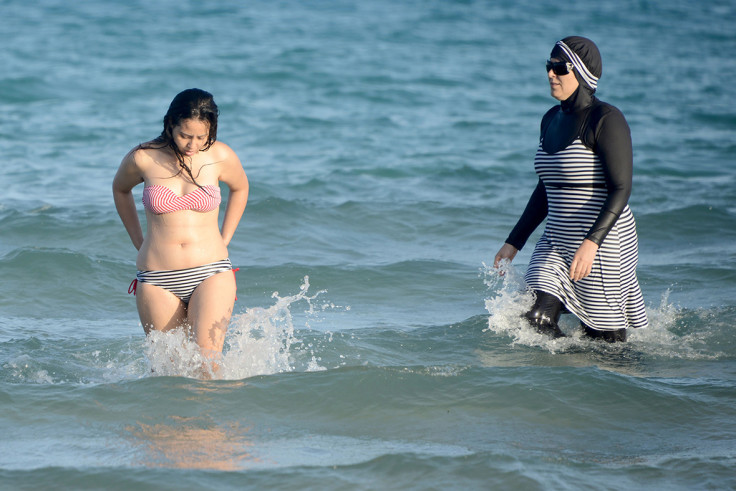France's 'morality police' provoke mockery and shame as beach burkini ban scandal widens
Witness on French Riviera speaks of Muslim woman on beach being told to 'Go home' as her daughter cries.
With undignified scenes on a Nice beach close to where an Islamist terrorist caused carnage on Bastille night on 14 July, France's bans on Muslim women wearing the so-called burkini turned from the bizarre to the farcical. One video clip shows a woman emerging from the sea to be greeted by armed police.
In a separate set of pictures, taken on Tuesday (23 August 2016), four policemen are seen standing over a middle-aged woman who had been lying alone on the sand. The officers watch as she removes a blue garment, presumably under instruction, and one policemen appears to either take notes or hand out an on-the-spot fine.
This follows similar incidents on the Riviera, where mayors have imposed bans on what Muslim women can wear at the beach that go beyond what French law requires in the street.
In some case, French sunbathers nearby have been heard applauding the officers and, in one case, even calling out "Go home" to the woman concerned.
The face-covering niqab is forbidden in public places, but full-bodied robes and a headscarf are deemed acceptable.
But more than 20 French towns have now introduced similar orders affecting beachwear with the support of the socialist prime minister Manuel Valls. Others have indicated they are ready to follow suit.
The draconian action has attracted much international mockery and even some well-known French figures have spoken out against them, calling the bans intolerant and also potentially dangerous, because they play into the hands of extremists intent on making Muslims feel as if they are under attack.
In their defence, the mayors cite tension after recent atrocities, including the Nice lorry attack of July 14 that claimed 86 lives and the murder of a Catholic priest as he took mass less than two weeks later.
I am always uneasy with trying to impose liberty by using of bans. We can not tell some women they cannot go to the beach because of their clothing, even if it observes an archaic neo-fundamentalism, and rightly causes shock
In Nice, the ban mentions a need to deter clothing that "overtly manifests adherence to a religion at a time when France and places of worship are the target of terrorist attacks".
Rachid Nakkez, a wealthy businessman born near Paris of Algerian origin but who renounced his French citizenship in protest at the 2011 ban on the face-covering veil in public, has promised to pay the fines of any woman punished as a result of the burkini bans.

As founder of the Hands of My Constitution group, he has already paid out 245,000 euros to cover the fines imposed on women under the existing law, which he vehemently opposes on human rights grounds even though he personally dislikes the garment.
"The pictures emerging are scandalous," he said. He added that he had yet to hear from any of the women concerned but believe one had lodged a complaint with a French anti-Islamophobia lobby group. Mr Nekkaz considers the bans concoct a "dangerous cocktail" of intolerance and paranoia.
The popular French actress Isabelle Adjani has also spoken out against the bans. "I find the polemic ridiculous and dangers," she told Le Journal du Dimanche newspaper. "I am always uneasy with trying to impose liberty by using of bans. We can not tell some women they cannot go to the beach because of their clothing, even if it observes an archaic neo-fundamentalism, and rightly causes shock."
Whatever next? And what is the likely effect on the minds of boys who see their mothers humiliated in this way? We are stoking up problems for ourselves
Last week, a Muslim mother-of-two who identified herself only by the name Siam, complained of "public humiliation" after she was fined in the Riviera resort of Cannes for wearing a tunic, leggings and a headscarf on the beach.
The notice issued to her said she was not wearing "an outfit respecting good morals and secularism", according to AFP.
The woman, a former air hostess from Toulouse who described her family as French citizens for three generations, told the agency: "I was sitting on a beach with my family. I was wearing a classic headscarf. I had no intention of swimming.
"Today we are not allowed on the beach. Tomorrow, the street? Tomorrow, we'll be forbidden from practising our religion at all? I'm in the country of human rights. I see no trace of the principles of liberty, equality and fraternity. I am outraged that this could happen in France."

Mathilde Cousin, a French television journalist who witnessed the scene, said: "I saw three police officers watching the beach. One of them had his finger on the trigger of his teargas device, no doubt containing pepper. The saddest thing was that people were shouting 'Go home'; some were applauding the police. Her daughter was crying."
The bans have divided French opinion. One Riviera resident, Renee Leroux, said: "I am ashamed to be French. I do not like this clothing, but what possible harm are they causing if what they are wearing would be perfectly legal on the street?
"Whatever next? And what is the likely effect on the minds of boys who see their mothers humiliated in this way? We are stoking up problems for ourselves."
In contrast, another French woman complained that people who supported the bans were condemned as "racist and Islamophobic" whereas women were also banned, for reasons of hygiene, from wearing traditional clothing on the beaches of Morocco, a Muslim country.
Colin Randall spent 29 years at The Daily Telegraph as reporter, chief reporter, executive news editor and Paris bureau chief, was executive editor for the launch of The National (UAE) in 2008, and now freelances and edits websites from London and the south of France. @salutsunderland
© Copyright IBTimes 2024. All rights reserved.






